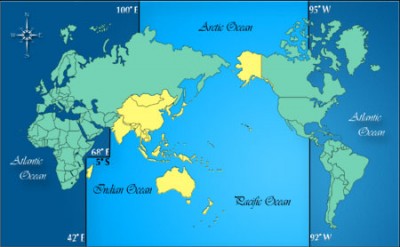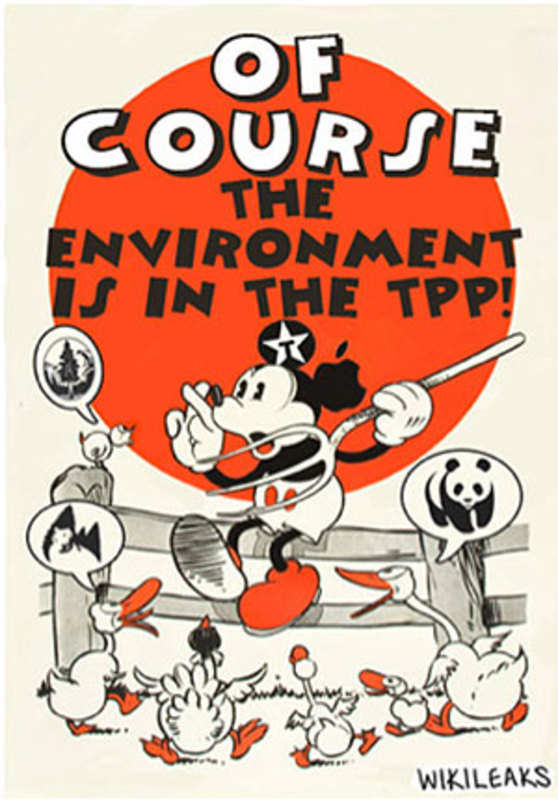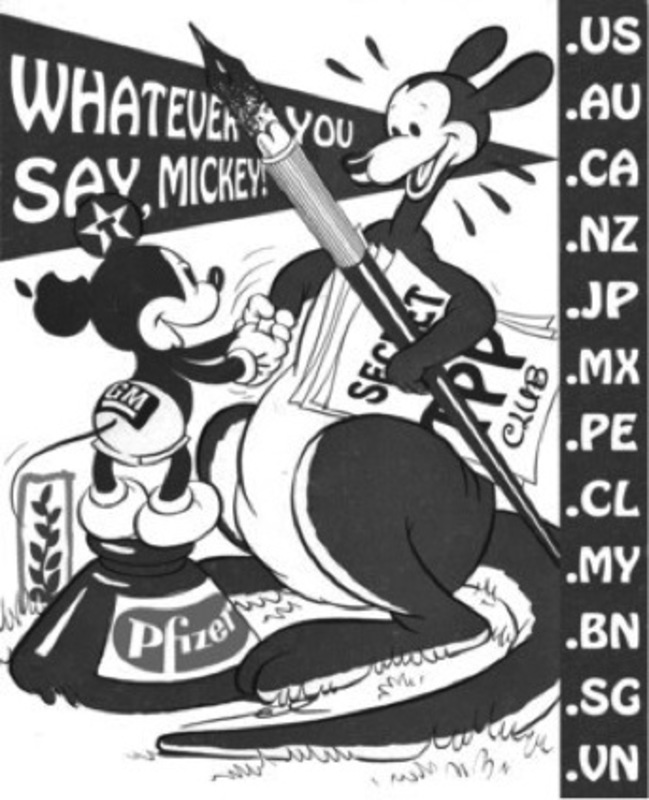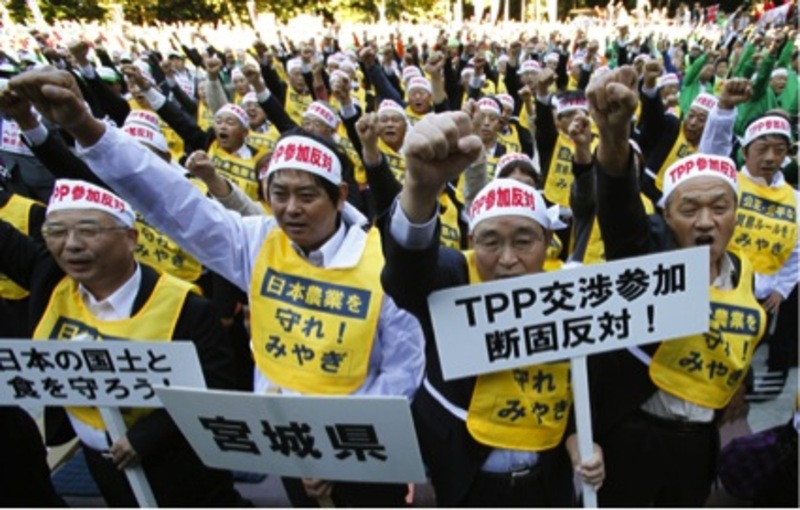WikiLeaks and the Secret TPP Environment Report

WikiLeaks has done it again – made available important documents that governments and corporate interests have tried to keep secret from the general public. Until this new release, we had almost no idea what was going on within the secret Trans Pacific Partnership (TPP) negotiations involving an extraordinarily diverse group of 12 large and small as well as rich and poor nations of East and Southeast Asia, Australasia, and North and South America.
The twelve are Australia, Brunei, Canada, Chile, Japan, Malaysia, Mexico New Zealand, Peru, Singapore, the United States and Vietnam, with the US driving the agenda. South Korea and Taiwan have also indicated that they may want to join. This time, we get a glimpse of the status of the Environment Chapter with important implications for the people and nature of the region. [WikiLeaks Press Release]1
 |
In this cartoon accompanying the release, WikiLeaks shows Mickey Mouse crossing his fingers while promising that “Of course, the environment is in the TPP!” Note the corporate logos symbolizing Texaco and Apple, while the (usually copyrighted) Disney character is singing his merry tune to the crowd of birds and geese (or are they ducks?) representing environmental organization. Crossing fingers can mean wishing for luck but, of course, it also signifies breaking a promise. How appropriate.
We have been told by its proponents that TPP is about reducing and eliminating “trade barriers” and making the world a better place, at least for countries that sign up for this deal. Critics of TPP have responded that it will destroy small-scale agriculture, tighten the corporate grip over intellectual property rights and subvert democratic rule-making. Many people have participated in large-scale protests, including in Japan. It has been difficult, however, to discern the nature of the agreement, since documents have been kept hidden from the general public throughout the protracted negotiations.
In 2010 when the debate about TPP as another Free Trade Agreement started in earnest in Japan, long-term trade critic Yamaura Yasuaki noted: “First of all, we note the negative results that FTA has brought. Examples include environmental destruction and the effect on wildlife as tropical forests have been cut down for palm oil production, and worsening conditions for factory workers as developing countries compete to increase exports at the lowest possible price. From many regions, there are also worrying reports of how staple food production has been sacrificed to export-oriented food production. Moreover, large investments and the expansion of financing have led to deprivation and debt in developing countries. Deregulation and free trade is also the main factor behind the collapse of the industrial order here in Japan, and we consider it directly responsible for deteriorating labour conditions.” [Consumers Union of Japan]2
By early 2014 observers were wondering whether significant progress was indeed being made, and what direction TPP would eventually take. How would this trade pact influence obligations to protect the environment and health? Since this is not being negotiated in a transparent way, would the new trade regime undermine efforts to deal with climate change and loss of biological diversity? Enter WikiLeaks on January 15 with the release of a very important report from the chair of one of the many working groups, dealing with the Environment Chapter. WikiLeaks has previously released other documents, including an earlier draft of the Chapter on Intellectual Property Rights, that the US had proposed, which the other countries rejected. The IP Chapter has been seen as a being so contentious that it was holding up the entire process. Now we learn that there is just as much controversy surrounding the Environment Chapter.
International vs. domestic obligations
TPP has been billed as an ambitious, 21st-century trade agreement. To live up to this, environmental organizations including the World Wildlife Fund and the Sierra Club have insisted that any new trade rules set up a mechanism for dealing with trade in products such as timber or species of animals or plants that are considered rare and near extinction. And many international treaties and conventions have been carefully negotiated elsewhere (usually under United Nations auspices) to make the world a better place by safeguarding the environment. Would TPP overrule these other treaties and conventions? Or might it establish better, more effective environmental protection? The Wikileaks revelations provide the first clear answers to these questions.
One problem is that the United States, the driving force in the negotiations, has not ratified several of the most important recent treaties pertaining to the environment, including the UN Convention on Biological Diversity (CBD) or the UN Climate Change Convention (FCCC). Another problem is that TPP involves both developed and developing economies, with different priorities.
What do the WikiLeaks texts reveal?
The chair of the working group for the Environment Chapter was asked in Brunei in 2013 to come up with a consolidated text, as disagreement among the 12 negotiating countries threatened to prevent them from achieving consensus. Note that there is a lot of disagreement on other issues as well, including intellectual property rights. The report that WikiLeaks has just released was tabled at the TPP meeting in Salt Lake City in November 2013, and as the report notes, “differences remain.” Countries cannot agree “how best to determine the appropriate role for [TPP] in addressing issues that are being dealt with or negotiated in other multilateral fora.” The chair’s report recognizes “that the dispute resolution provisions have been a particularly challenging issue…” It also makes clear that countries have “red lines” which are areas on which they absolutely will not give in. The chair’s report notes that “many of the red lines for some Parties were in direct opposition to the red lines expressed by other Parties.” Hence the impasse.
[WTO Case Study by the Asser Institute]4
The documents reveal that Japan plays a major role in obstructing the progress of the Environment Chapter. Japan is “concerned” with the language relating to equivalency in the scope of the coverage, that is, the question of how a country may deal with imported products that are identical or almost identical with domestically produced products. For example, imported timber from tropical forests would compete with “similar” wood products produced domestically, unless rules are in place to prevent this. Without international rules, it would be impossible for an importing country to compete with countries that export wood products manufactured by corporations that engage in clear-cutting. Increased trade in such timber would lead to even more destruction of rainforests, and less ability to control the corporations that engage in unsustainable logging practices. Efforts to label genetically modified organisms (GMO) and provide consumers with information about how food has been produced could also be curbed.
 |
On the other hand, we learn that Japan has joined all other nations in opposing a proposal by the United States related to how to address other environmental agreements. This is connected to whether or not the novel dispute settlement mechanism in the TPP should be implemented. The United States, which has refused to ratify many global environmental agreements, seeks to settle trade conflicts in the TPP rather than the WTO. This could make it difficult for countries like Japan to maintain stricter domestic legislation that resulted from having ratified other environmental agreements.
WikiLeaks also reveals disagreement regarding marine capture fisheries and fish products, including a proposal about overfishing and overcapacity. The leaked text has provisions that might help deal with fisheries bycatch. As a free trade agreement, the aim is to make it more difficult for governments to control corporate interests, for example by limiting investments in ever larger fishing ships. But Japan, Australia, New Zealand and Malaysia cannot agree to the language on bycatch as it is currently drafted. Shark fins is one such product that some countries are trying to make illegal. Over-fishing of Pacific Bluefin tuna is another issue that is managed by governments through negotiations, in a complex process that should not be undermined by TPP. The language on fisheries subsidies only say that countries “shall make best efforts to refrain” from introducing new subsidies that contribute to overcapacity and overfishing. If TPP can do no better than hoping that countries make “best efforts”, that is, if it fails to establish guidelines to prevent overfishing that threatens endangered species, it seems futile to hope that international trade in fish and fish products will become more sustainable.
Biological diversity is another area of contention due to the United States failure to ratify the UN Convention on Biological Diversity – due in turn to pressure from its biotech industry, which saw the Convention as a direct threat to the introduction of patented genetically modified organisms around the world. As for conservation, which includes a reference to the Convention on Trade in Endangered Species (CITES), the international agreement among governments to ensure that international trade in specimens of wild animals and precious plants does not threaten their survival, Japan and all other negotiating parties remain opposed to the US proposals in the TPP.
TPP vs. WTO
The TPP does not emerge in a vacuum. 20 years ago, when the World Trade Organization (WTO) was launched some mechanisms established environmental and health protection. There is also a dispute panel system that generally works fairly, although it has been heavily criticized.
In the 21st-century, one would expect trade negotiators to try to do better than striking down an established system, even one with serious flaws, in the absence of effective protections. The TPP, if it is to be at all acceptable, should do better than the WTO on a range of issues from environmental protection to limits on corporate abuses. Critics of WTO note that it is on record as challenging domestic laws that would bar dolphin meat in tuna products, complicate protecting sea turtles from getting killed in shrimpers’ nets, and make it difficult to impose higher pollution control standards on imported gasoline. The general public, of course, if given a say, would strongly urge trade negotiators to improve such a system that came out of complex global negotiations over 20 years ago. Other controversial WTO cases have involved trade in timber logged from tropical forests and attempts to ban imports of meat from cattle treated with growth hormones. There is also one case in which a country was able to keep its domestic ban on asbestos, which an asbestos exporting country had tried to strike down. If the WTO offered at best weak environmental protection, all signs point to the TPP as watering down even these minimal restraints. [Citizen Trade – WTO & Environment]5
 Miyagi farmers in 2011 demonstration in Tokyo: Protect Japanese agriculture Miyagi farmers in 2011 demonstration in Tokyo: Protect Japanese agriculture |
Joining a trade agreement like TPP has been called joining a compact. The cost of accepting international standards should be offset by the benefits of gaining access to a globally regulated market with guarantees against protectionism. The key word here is “regulated” as countries have obligations to protect the environment and public health within their borders, according to domestic laws. But countries also generally prefer to sign up to and ratify international environmental agreements, because of recognition that many issues involving pollution and resource depletion – or natural phenomena, like the ozone layer or bird migration – can only be addressed internationally.
Other quandries
From a negotiator’s standpoint, holding out on agreement on an issue in the Environment Chapter may help gain benefits in other chapters. Disagreeing or agreeing with American demands, for example, may only be a tactical step, not necessarily something that reflects a country’s core priorities. Progress, if that is the right term, can also depend on how negotiations develop, for example in the Goods and Services Market Access Chapter. At some late stage in the complex matrix of multilateral negotiations, desperate compromises could be made that ought to be subject to open public debate.
Additionally, the differences between the WTO’s dispute settlement system and the TPP’s Investor-State Dispute (ISD) resolution system suggest how far TPP negotiating countries are from reaching a deal. Briefly, the WTO system allows governments to take other governments to the WTO dispute panel; TPP instead follows the NAFTA tribunal model that allows private corporate investors to directly sue governments. [New York Times – NAFTA’s Powerful Secret]6
Australia, for example, was sued by Philip Morris and other tobacco companies when it tried to regulate the warning labels on cigarette packs. Philip Morris and its lawyers took advantage of a bilateral free trade agreement between Hong Kong and Australia that included a clause for ISD resolution. This has been seen as a bellwether for worse to come, should the TPP include similar provisions.
Japan’s general position so far on ISD seems to be supportive of the NAFTA model which prioritizes the legal rights of corporations to make investments over the protective role of states. Japan has inserted such clauses in other bilateral trade agreements. But it is not known at this point what Tokyo really wishes to achieve within the TPP, and how it will respond to local protests, for example the JA’s opposition to corporations engaging in large-scale farming. In 2011, Australia rejected ISD but it remains to be seen whether its position will survive the negotiation process. Interestingly, New Zealand has indicated that Australia would not be able to opt out of this particular Chapter since “an international trade negotiation is a reciprocal process with give and take on all parts. Negotiating parties, including New Zealand, are unlikely to agree that special treatment, such as exclusion from Investor-State Dispute settlement procedures, applies to one party but not to the other parties.”
[Multiple countries rejecting dispute settlement]7
[The US Should Follow South Africa’s Lead]8
[Investor-State Dispute Provisions]9
WikiLeaks has done the world a huge service by showing how far apart the 12 countries are with regard to the Environment Chapter, which could strengthen the ability of countries to protect the environment and natural resources. Those who have expressed doubts about the TPP have been proven right. These important documents reveal that there has been no progress at all on trade-related issues that we know are damaging the environment; be it climate change, biological diversity, logging or over-fishing.
Activists and journalists, as well as concerned citizens who are trying to probe deeper into the ways the TPP will shape our future, take note. At the same time, the documents make clear that there is far from consensus among the negotiating parties on the most sensitive issues, and that everything is possible, including collapse of the negotiations.
Martin J. Frid was born in Sweden and works for Consumers Union of Japan. He is the author of the food guide book Nippon no Shoku no Anzen 555 (Kodansha) published in 2009. He has participated in food safety meetings on the local, national, and international levels, including as an expert at FAO/WHO Codex Alimentarius Commission meetings, and participated at the TPP conference in Brunei in 2013 as a stakeholder. He currently resides in Saitama, Japan.
Notes
2 Yamaura, Y. Consumers Union of Japan
3 Roberts, C. WWF Green Groups Leaked Trans-Pacific-Partnership Environment Chapter Unacceptable
4 WikiLeaks Environmental Chair Report
5 Public Citizen Public Citizen – Environment
6 Asser Institute Asser Institute
8 Eaton, J. Sierra Club Canada
9 Drake, C. AFL-CIO Politcal Action Legislation: The U.S. should follow South Africa’s Lead on Investor Rights – No ISDS in the TPP

